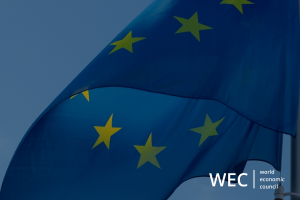Germany’s Ideological Shift: The Rise of Socialism and the Resurgence of Right-Wing Parties
Examining the Impact on the Economy and Contrasting European Trends
World Economic Council | June 9, 2023 | Washington DC
In a surprising turn of events, Germany, once heralded for its robust free-market economy and conservative values, has been experiencing a profound ideological shift towards socialist tendencies hidden under a veil of green activism with a clear radical left wing agenda.This transformation has not occurred in isolation, but rather echoes a broader trend seen across several European nations. Simultaneously, the continent has witnessed the rise of right-wing political movements, providing a contrasting narrative to the prevailing socialist sentiments. This article delves into Germany’s ideological shift, explores its impact on the economy, and examines the simultaneous rise of right-wing parties in Europe.
Germany’s move towards socialism cannot be understood without considering its European counterparts. Countries such as France, Spain, and Greece have all witnessed the growth of left-wing movements advocating for increased government intervention and expanded welfare programs. While the degree of socialistinfluence may vary, Germany’s economic significance and traditionally conservative stance make its shift particularly noteworthy.
Moreover, this ideological shift in Germany occurs in tandem with the resurgence of right-wing parties across Europe. These parties, propelled by nationalist and populist ideologies, have emerged as a response to perceived negative consequences of socialist policies, including economic stagnation, concerns over immigration, and fears of losing national identity.
Germany’s right-wing party, Alternative for Germany (AfD), has gained momentum in recent years. AfD’s primary agenda revolves around stricter immigration policies, Euroscepticism, and opposition to what they perceive as the failures of socialism. Although the rise of AfD does not directly counterbalance the prevailing socialist tendencies, it serves as a crucial reminder of the concerns held by a significant portion of the population.
France, too, has experienced the ascent of the National Rally (RN), formerly known as the National Front, under the leadership of Marine Le Pen. RN’s platform challenges globalization, advocates for protectionist measures, and expresses skepticism towards the European Union. This right-wing resurgence in France presents an alternative narrative to the prevailing socialist sentiments.
Similarly, Spain has seen the emergence of Vox, a right-wing party that promotes stricter immigration policies, centralized governance, and Spanish nationalism. Vox’s rise reflects a growing backlash against the left-leaning policies of the incumbent socialist government, signaling a desire for change among certain segments of the population.
While Germany’s shift towards socialism has raised concerns, its economic impact is cause for greater scrutiny. The implementation of socialist policies has resulted in sluggish economic growth, burdening businesses with excessive regulations, discouraging investment, and stifling entrepreneurship. Germany’s GDP growth rate has significantly declined over the years.
Furthermore, the high tax burden placed on businesses and high-income earners, while initially intended for wealth redistribution, has hindered investment, innovation, and entrepreneurial activities.
Additionally, Germany’s global competitiveness has diminisheddue to excessive regulations and labor market inflexibility, making it harder for businesses to compete internationally. As Germany has moved towards socialist tendencies, public debt has also skyrocketed. The burden of servicing this debt will inevitably fall upon future generations, potentially hindering their economic prospects. Graph 4 illustrates the concerning rise in Germany’s public debt-to-GDP ratio.
Germany’s shift towards socialism cannot be viewed in isolation. It must be understood in the context of the broader European landscape, where other countries have also experienced similar ideological shifts, albeit with varying degrees. The rise of right-wing parties across Europe serves as a counterbalance to these socialist tendenciesand reflects the concerns of citizens regarding the economic consequences and preservation of national identity.
France’s prolonged socialist policies, for example, have resulted in a sluggish economy, high unemployment rates, and limited business competitiveness. The heavy tax burden and excessive regulations have stifled entrepreneurial spirit and investment, hindering economic growth and innovation. Similarly, Greece’s flirtation with socialism led to an unsustainable expansion of the welfare state, a crippling public debt crisis, and a severe economic downturn. The subsequent bailout measures and austerity programs served as stark reminders of the pitfalls of embracing extreme socialist policies.
In Spain, socialist policies implemented during the global financial crisis led to increased government intervention and elevated public debt. The country struggled to recover, with persistently high unemployment rates and a weakened private sector. These instances highlight the need to strike a balance between social welfare aspirations and the imperative for a thriving free-market economy.
Germany now stands at a critical juncture. The trajectory towards socialism has had a direct negative impact on its economy, characterized by sluggish growth, high taxes, diminished competitiveness, and mounting public debt. While the intentions behind such policies may be noble, it is essential to consider the long-term consequences. Striking a balance between social welfare and a thriving free-market economy is crucial for safeguarding Germany’s economic prosperity and its competitiveness on the global stage.
In light of the simultaneous rise of right-wing parties across Europe, it is evident that a significant portion of the population holds concerns about the economic and cultural implications of socialist tendencies. These right-wing movements, fueled by nationalism and populism, offer an alternative narrative that resonates with those who perceive negative consequences of socialist policies.
Germany must heed the growing voices calling for a reevaluation of its socialist trajectory. Embracing free-market principles, fostering entrepreneurship, reducing excessive regulations, and encouraging investment can reignite economic growth and restore the country’s competitive edge.Simultaneously, policymakers must address the concerns fueling the rise of right-wing parties, such as immigration and the preservation of national identity, through comprehensive and balanced approaches.
As Germany stands at this crossroads, it must learn from the experiences of other European nations and chart a course that ensures both economic prosperity and societal well-being. The road ahead demands thoughtful deliberation, evidence-based policy decisions, and a willingness to strike a harmonious balance between competing ideologies. Only by navigating these challenges effectively can Germany secure a prosperous future for its citizens while maintaining its standing as a global economic powerhouse.
Furthermore, the ideological shift in Germany and its correlation with rising right-wing parties across Europe reflects a broader societal discontent and a longing for alternative solutions. It signifies a growing recognition among citizens that the prevailing socialist tendencies have not yielded the desired outcomes and have, in fact, posed challenges to economic growth, individual liberties, and national cohesion.
The rise of right-wing parties offers an alternative vision for governance, one that emphasizes national sovereignty, immigration control, and economic liberalism. These parties, often labeled as populist or nationalist, have gained popularity by addressing the concerns of those who feel left behind by the socialist agenda.
However, it is important to note that the rise of right-wing parties does not necessarily provide a direct counterbalance to the socialist tendencies. Rather, it signifies a nuanced political landscape where diverse ideologies and interests intersect. While these parties challenge the status quo and advocate for different policy approaches, their rise should not be viewed as a wholesale rejection of socialism, but rather as a call for a reevaluation and recalibration of policies to address the pressing issues facing society.
Germany, as a leading European nation, plays a pivotal role in shaping the future trajectory of the continent. It must navigate this ideological shift with caution, taking into account the concerns of its citizens while maintaining a focus on economic prosperity and global competitiveness.
To achieve this balance, Germany could consider adopting a pragmatic approach that incorporates elements from various ideologies. This could involve implementing targeted welfare programs that address specific societal needs while preserving the incentives for entrepreneurship and innovation. Emphasizing economic freedom, reducing regulatory burdens, and fostering a business-friendly environment would help reinvigorate the economy and attract investment.
Moreover, a comprehensive immigration policy that combines effective border control with a fair and transparent system for legal immigration would address citizens’ concerns while acknowledging the benefits that migration can bring to the economy.
Germany’s journey towards finding this equilibrium will require robust public discourse, a commitment to evidence-based policymaking, and a willingness to engage with diverse perspectives. It is through respectful dialogue and an open exchange of ideas that a sustainable and inclusive path forward can be forged.
In conclusion,Germany’s ideological shift towards socialism, coupled with the rise of right-wing parties across Europe, reflects a complex and evolving political landscape. The negative impact on Germany’s economy resulting from socialist tendencies necessitates a reevaluation of policies to strike a balance between social welfare and economic prosperity. By embracing a pragmatic approach, Germany can address the concerns of its citizens while fostering a dynamic and competitive economy. It is in this delicate equilibrium that Germany can find the path to a prosperous and harmonious future, contributing to the overall stability and progress of Europe as a whole.






